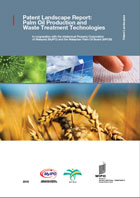Patent Landscape Report on Palm Oil Production and Waste Treatment Technologies
Publication year: 2016
DOI: English

This report provides an overview of the global patent landscape in the area of palm oil production and waste exploitation, and includes national patent applications from Malaysia. It covers patenting activity related to technologies in production of palm oil and palm kernel oil, and treatment of waste from palm oil production.
- Topic: Food and Agriculture / Environment and Energy
- Cooperation partners: Intellectual Property Corporation of Malaysia (MyIPO); Malaysian Palm Oil Board (MPOB)
Palm oil is the most produced edible plant oil in the world and demand is rapidly growing. Palm oil industry is an essential part of the economy of Malaysia and Indonesia, as well as other South-East Asian countries, and plays an important role in the economies in Latin America and Africa.
As the growth of the industry has imposed tremendous pressure on ecological systems and environment, a more sustainable growth and use of oil palms are highly in demand. Understanding the state of the art of technologies in this field is essential in making policies, conducting research and development and in establishing collaborations.
The report was prepared at the request of and in collaboration with the Intellectual Property Organization of Malaysia (MyIPO) and the Malaysian Palm Oil Board (MPOB) in view of the importance of this area for the Malaysian economy. It provides an overview of the global patent landscape in the area of palm oil production and waste exploitation, and includes national patent applications from Malaysia, provided by MyIPO, using the MyIPO database and following the same patent search strategy as for the rest of the report.
It covers patenting activity related to technologies in the following areas:
- Production of palm oil and palm kernel oil, i.e. growing and harvesting the fruit, processing of the fruit, extraction, and refining of the oils, etc.; and
- Treatment of waste from palm oil production, extraction of phytonutrients, utilization of palm bio-mass and/or by-products generated by the palm oil for food and beverage, cosmetics, biofuel, and other industrial areas.
This report is intended to be used by MPOB and other Malaysian institutions and companies, as well as other economies in South-East Asia, Latin America and Africa, where palm oil plays an important role for the local and regional economies. It also serves as a complementary resource to scientific publications for researchers, as well as a tool for strategic decision-making.